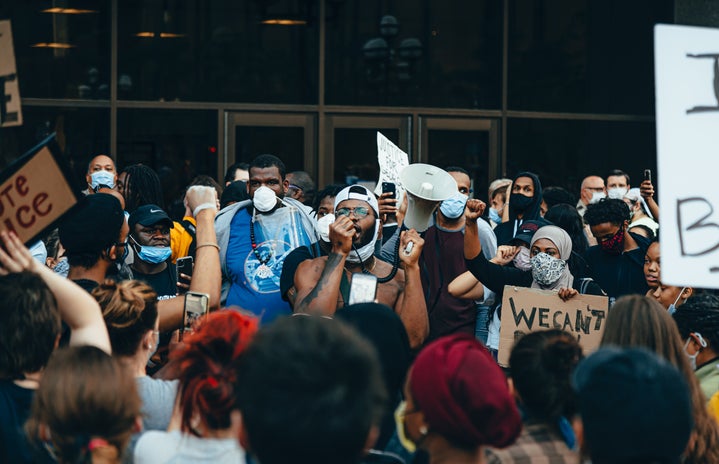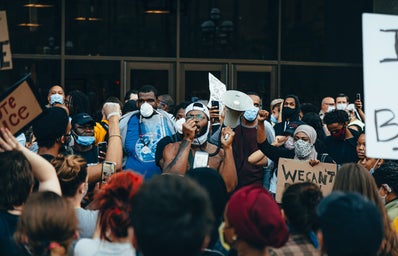People of colour have historically had and continue to have a significant yet overlooked impact on all aspects of culture—from inventions to entertainment to social theory, the Black community has helped weave the very framework of our society.
Black History Month is a great opportunity to discover these stories. The 4 individuals below have made essential contributions to their respective fields, helping to grant rights to and empower women, the LGBTQ+ community, those with disabilities, and the environment.
Kimberlé Crenshaw: feminist theory and intersectionality
Kimberlé Crenshaw is a scholar and writer on civil rights, critical race theory, and Black feminist legal theory. Her work is pivotal in the understanding of systems of power. Crenshaw coined the term ‘intersectionality’ in 1989 to describe the simultaneous and reinforcing nature of prejudice in which multiple identities converge to create a unique lived experience of oppression.
For example, a white woman will face barriers due to her gender as opposed to her race, while a Black man will face barriers due to his race rather than his gender. Black women, on the other hand, suffer simultaneously from racism and sexism. Their experiences of oppression are shaped by the way these two systems interact and compound each other. Other identities add additional ‘intersections’ which influence the privilege or prejudice one feels, including class, sexuality, disability, and others.
Crenshaw’s work has helped identify key issues perpetuating inequalities, like the school-to-prison pipeline that impacts Black youth in the United States. Crenshaw helped to launch the #SayHerName campaign across social media after seeing how Black female victims of police brutality are often less remembered than their male counterparts. The #SayHerName campaign highlights these victims and keeps their fights for justice alive—names such as Breonna Taylor, Sandra Bland, and Korryn Gaines.
Marsha P. Johnson: trans visibility and lgbtq+ pride
Marsha P. Johnson was a trans woman of colour and activist. She moved to New York City after graduating high school where she became part of the growing LGBTQ+ community—one which struggled to find acceptance at a time when their rights were severely limited. While she occasionally worked as a waitress or performed in drag shows, Johnson made most of her money as a sex worker where she often suffered from violence at the hands of her clients.
Johnson expressed herself through fashion and was known for her lavish outfits. She curated her style through thrift store finds, gifts from friends, items found on the street, and crowns of fresh flowers that she designed and created herself.
On June 28th, 1969, Johnson became part of the famous Stonewall Riots where police officers raided a gay bar and patrons of the Stonewall resisted. Johnson was one of many trans women on the front lines of this riot who fought against not only the efforts of the police but also the discrimination and oppression they felt every day. The Stonewall Uprising was an awakening for LGBTQ+ activists who began to stage rallies, sit-ins, and meetings for liberation. The events of June 28 paved the way for the first Gay Pride Parade in 1970. During this movement, Johnson advocated for transgender representation and for the protection of trans youth.
lois curtis: the right to live independently
Lois Curtis was a Black artist and disability activist. At the age of 11, Curtis was institutionalized at Georgia Regional Hospital due to her intellectual and developmental disabilities. She remained there until she was 29 despite the fact that her care team expressed that she was able to leave and live within the community. The state of Georgia did not wish to give Curtis the funds she needed to live independently.
In 1995, Curtis took legal action against the Georgia Department of Human Resources commissioner, Tommy Olmstead, whose decision kept Curtis institutionalized. This case eventually escalated to the Supreme Court, where it was decided that Olmstead’s decision was unconstitutional. Now seen as a landmark case (Olmstead v. LC), this ruling ended unjustified segregation of people with disabilities and established the right for people with disabilities to live independently in their communities as opposed to in institutions.
Following the Olmstead Decision, Curtis was able to live in an apartment with a care assistant. She pursued a career as an artist and made several friends within her community. In a 2014 interview, Curtis described how she lives on her own terms, saying: “I feel good about myself. My life a better life.”
George Washington Carver: environmental stewardship
George Washington Carver is often included in lists of Black trailblazers, and for good reason. Born into slavery in 1864, Carver thrived despite the social barriers of the time and worked as a successful botanist, agriculturalist, inventor, and scientist.
Decades before the genesis of modern environmentalism, Carver believed in man’s duty to produce food to feed impoverished populations, advocated for the protection of the planet and its inhabitants, and understood the interconnectedness between the environment and human beings. He assisted poor farmers in rural Alabama by helping to develop regionally integrated and sustainable food systems. Carver taught them research-based farming methods such as crop rotation that would increase both crop yields and income.
Carver held a deep respect for nature and didn’t believe that man was above the natural world—a common belief at the time—but was instead part of it. In his 1894 Master’s thesis entitled Plants as Modified by Man, Carver wrote: “man must take the initiative in using nature to provide sustainable food systems that will help to alleviate hunger, encourage local participation and activism, and to safeguard and control our local food and water systems.”
—
This list is in no way comprehensive, so we encourage you to continue learning about Black stories and the way in which Black people fight against injustice, both during Black History Month and beyond.


